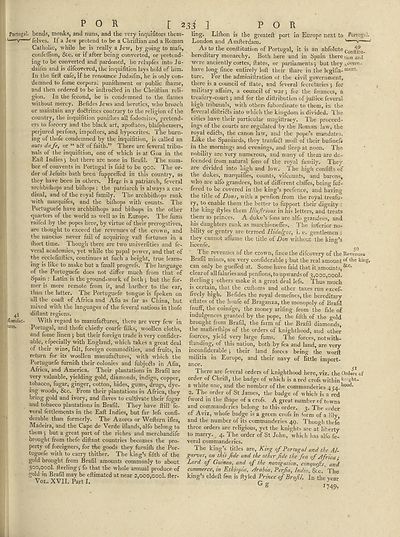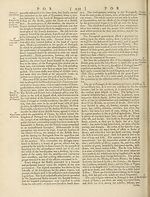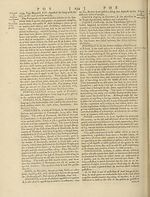Encyclopaedia Britannica, or, a Dictionary of arts, sciences, and miscellaneous literature : enlarged and improved. Illustrated with nearly six hundred engravings > Volume 17, Poetry-RHI
(249) Page 233
Download files
Complete book:
Individual page:
Thumbnail gallery: Grid view | List view

P O R [2
Portugal, bends, monks, and nuns, and the very inqtilfitors them-
—Y—J felves. If a Jew pretend to be a Chriftian and a Homan
Catholic, while he is really a Jew, by going to mafs,
confeflion, &c. or if after being converted, or pretend¬
ing to be converted and pardoned, he relapfes into Ju-
-daiim and is difcoVefed, the inquifition lays hold of him.
In the firll cafe, if he renounce Judaifm, he is only con¬
demned to fome corporal punilhment or public lhame,
and then ordered to be initrufted in the Chriftian reli¬
gion. In the fecond, he is condemned to the flames
without mercy. Befides Jews and heretics, who broach
or maintain any doftrines contrary to the religion of the
country, the inquifition puniflies all fodomites, pretend¬
ers to forcery and the black art, apoftates, blafphemers,
perjured perfons, impoftors, and hypocrites. The burn¬
ing of thofe condemned by the inquifition, is called an
auto da fe, or “ a£t of faith.” There are feveral tribu¬
nals of the inquifition, one of which is at Goa in the
Eart Indies; but there are none in Brafil. The num¬
ber of convents in Portugal is faid to be 900. The or¬
der of Jefuits hath been fuppreffed in this country, as
they have been in others. Heje is a patriarch, feveral
archbifliops and bifliops : the patriarch is always a car¬
dinal, and of the royal family. The archbilhops rank
with marquifes, and the bifliops with counts. The
Portuguefe have archbifliops and bilhops in the other
quarters of the world as ivell as in Europe. The fums
railed by the popes here, by virtue of their prerogatives,
are thought to exceed the revenues of the crown, and
the nuncios never fail of acquiring vaft fortunes in a
fliort time. Though there are two univerfities and fe¬
veral academies, yet while the papal power, and that of
the ecclefiaftics, continues at fuch a height, true learn¬
ing is like to make but a fmall progrefs. The language
of the Portuguefe does not differ much from that of
Spain : Latin is the ground-work of both ; but the for¬
mer is more remote from it, and harlher to the ear,
than the latter. The Portuguefe tongue is fpoken on
all the coaft of Africa and Alia as far as China, but
mixed with the languages of the leveral nations in thofe
diflant regions.
With regard to manufactures, there are very few in
Portugal, and thofe chiefly coarfe filks, woollen cloths,
and fome linen 5 but their foreign trade is very confider-
able, efpecially with England, which takes a great deal
of their wine, fait, foreign commodities, and fruits, in
return for its woollen manufactures, with which the
Portuguefe furnilh their colonies and fubjeCts in Afia,
Africa, and America. Their plantations in Brafil are
very valuable, yielding gold, diamonds, indigo, copper,
tobacco, fugar, ginger, cotton, hides, gums, drugs, dye¬
ing woods, &c. From their plantations in Africa, they
bring gold and ivory, and flaves to cultivate their fugar
and tobacco plantations in Brafil. They have Hill fe¬
veral fettlements in the Eafi: Indies, but far lefs confi-
derable than formerly. The Azores or Weftern ifles,
Madeira, and the Cape de Verde iflands, alfo belong to
them ; but a great part of the riches and merchandife
brought from thefe diftant countries becomes the pro¬
perty of foreigners, for the goods they furnifli the Por¬
tuguefe with to carry thither. The king’s fifth of the
gold brought from Brafil amounts commonly to about
300,000!. fterlingfo that the whole annual produce of
gold in Brafil may be eftimated at near 2,ooo,oool. fter-
Vol. XVII. Part I.
4S
/lanufac
1 FOR
ling. Lifbon is the greateft port in Europe next to Portugal.
London and Amfterdam. w--v—
As to the conilitution of Portugal, it is an abfolute
hereditary monarchy. Both here and in Spain there tion and
were anciently cortes, flates, or parliaments ; but they *,ovem-
have long fince entirely loft their fliare in the legilla- ment-
ture. lor the adminiilration of the civil government,
there is a council of ftate, and feveral fecretaries j for
military affairs, a council of war; for the finances, a
treatury-court; and for the diftribution of jultice feveral
high tribunals, with others fubordinate to them, in the
feveral diftricfs into which the kingdom is divided. The
cities have their particular magiitracy. The proceed¬
ings of the courts are regulated by the Roman laiv, the
royal edi6fs, the canon laiv, and the pope’s mandates.
Like the Spaniards, they t ran fa <51 moft of their bufinef*
in the mornings and evenings, and fleep at noon. The
nobility are very numerous, and many of them are de-
fcended from natural fons of the royal family. They
are divided into high and low7. The high confifts of
the dukes, marquiffes, counts, vifcounts, and barons,
who are alfo grandees, but of different claffes, being fuf-
fered to be covered in the king’s prefence, and having
the title of Dons, with a penfion from the royal treafu-
ry, to enable them the better to fupport their dignity :
the king ftyles them Ihujlnous in his letters, and treats
them as princes. A duke’s fons are alfo grandees, and
his daughters rank as marchioneffes. The inferior no¬
bility or gentry are termed Hidalgos, i. e. gentlemen :
they cannot affume the title of Don without the kinc’s
licenfe. ^
The revenues of the crown, fince the difcovery of the Revenues
Brafil mines, are very confiderable 5 but the real amount the kil)g,
can only be gueffed at. Some have faid that it amounts, ^c"
clearof allfalariesand penfions,to upwards of 3,000,000!.
fterling ; others make it a great deal lefs. Thus much
is certain, that the cuftoms and other taxes run excef-
fively high. Befides the royal demefnes, the hereditary
eftates of the houfe of Braganza, the monopoly of Brafil
Inuff, the coinage, the money arifing from the fale of
indulgences granted by the pope, the fifth of the gold
brought from Brafil, the farm of the Brafil diamonds,
the mafterfliips of the orders of knighthood, and other
fources, yield very large fums. The forces, notwith-
ftanding, of this nation, both by fea and land, are very
inconfiderable their land forces being the Avorft
militia in Europe, and their navy of little import¬
ance.
There are feveral orders of knighthood here, viz. the Orders of
order of Chrift, the badge of which is a red crofs wfithin ^
a white one, and the number of the commanderics 454.hootl*
2. The order of St James, the badge of which is a red
fword in the fhape of a crofs. A great number of towns
and commanderies belong to this order. 3. The order
of Aviz, whofe badge is a green crofs in form of a Kly,
and the number of its commanderies 49. Though thefe
three orders are religious, yet the knights are at liberty
to marry. 4. The order of St John, which has alfo fe¬
veral commanderies.
The king’s titles are, King of Portugal and the Al-
garves, on this fide and the other fide the fea of Africa ;
Lord of Guinea, and of the navigation, conquefs, and
commerce, in Ethiopia, Arabia, Perfa, India, &c. The
king’s eldeft fon is ftyied Prince of Braftl, In the year
Gg J749>
Portugal, bends, monks, and nuns, and the very inqtilfitors them-
—Y—J felves. If a Jew pretend to be a Chriftian and a Homan
Catholic, while he is really a Jew, by going to mafs,
confeflion, &c. or if after being converted, or pretend¬
ing to be converted and pardoned, he relapfes into Ju-
-daiim and is difcoVefed, the inquifition lays hold of him.
In the firll cafe, if he renounce Judaifm, he is only con¬
demned to fome corporal punilhment or public lhame,
and then ordered to be initrufted in the Chriftian reli¬
gion. In the fecond, he is condemned to the flames
without mercy. Befides Jews and heretics, who broach
or maintain any doftrines contrary to the religion of the
country, the inquifition puniflies all fodomites, pretend¬
ers to forcery and the black art, apoftates, blafphemers,
perjured perfons, impoftors, and hypocrites. The burn¬
ing of thofe condemned by the inquifition, is called an
auto da fe, or “ a£t of faith.” There are feveral tribu¬
nals of the inquifition, one of which is at Goa in the
Eart Indies; but there are none in Brafil. The num¬
ber of convents in Portugal is faid to be 900. The or¬
der of Jefuits hath been fuppreffed in this country, as
they have been in others. Heje is a patriarch, feveral
archbifliops and bifliops : the patriarch is always a car¬
dinal, and of the royal family. The archbilhops rank
with marquifes, and the bifliops with counts. The
Portuguefe have archbifliops and bilhops in the other
quarters of the world as ivell as in Europe. The fums
railed by the popes here, by virtue of their prerogatives,
are thought to exceed the revenues of the crown, and
the nuncios never fail of acquiring vaft fortunes in a
fliort time. Though there are two univerfities and fe¬
veral academies, yet while the papal power, and that of
the ecclefiaftics, continues at fuch a height, true learn¬
ing is like to make but a fmall progrefs. The language
of the Portuguefe does not differ much from that of
Spain : Latin is the ground-work of both ; but the for¬
mer is more remote from it, and harlher to the ear,
than the latter. The Portuguefe tongue is fpoken on
all the coaft of Africa and Alia as far as China, but
mixed with the languages of the leveral nations in thofe
diflant regions.
With regard to manufactures, there are very few in
Portugal, and thofe chiefly coarfe filks, woollen cloths,
and fome linen 5 but their foreign trade is very confider-
able, efpecially with England, which takes a great deal
of their wine, fait, foreign commodities, and fruits, in
return for its woollen manufactures, with which the
Portuguefe furnilh their colonies and fubjeCts in Afia,
Africa, and America. Their plantations in Brafil are
very valuable, yielding gold, diamonds, indigo, copper,
tobacco, fugar, ginger, cotton, hides, gums, drugs, dye¬
ing woods, &c. From their plantations in Africa, they
bring gold and ivory, and flaves to cultivate their fugar
and tobacco plantations in Brafil. They have Hill fe¬
veral fettlements in the Eafi: Indies, but far lefs confi-
derable than formerly. The Azores or Weftern ifles,
Madeira, and the Cape de Verde iflands, alfo belong to
them ; but a great part of the riches and merchandife
brought from thefe diftant countries becomes the pro¬
perty of foreigners, for the goods they furnifli the Por¬
tuguefe with to carry thither. The king’s fifth of the
gold brought from Brafil amounts commonly to about
300,000!. fterlingfo that the whole annual produce of
gold in Brafil may be eftimated at near 2,ooo,oool. fter-
Vol. XVII. Part I.
4S
/lanufac
1 FOR
ling. Lifbon is the greateft port in Europe next to Portugal.
London and Amfterdam. w--v—
As to the conilitution of Portugal, it is an abfolute
hereditary monarchy. Both here and in Spain there tion and
were anciently cortes, flates, or parliaments ; but they *,ovem-
have long fince entirely loft their fliare in the legilla- ment-
ture. lor the adminiilration of the civil government,
there is a council of ftate, and feveral fecretaries j for
military affairs, a council of war; for the finances, a
treatury-court; and for the diftribution of jultice feveral
high tribunals, with others fubordinate to them, in the
feveral diftricfs into which the kingdom is divided. The
cities have their particular magiitracy. The proceed¬
ings of the courts are regulated by the Roman laiv, the
royal edi6fs, the canon laiv, and the pope’s mandates.
Like the Spaniards, they t ran fa <51 moft of their bufinef*
in the mornings and evenings, and fleep at noon. The
nobility are very numerous, and many of them are de-
fcended from natural fons of the royal family. They
are divided into high and low7. The high confifts of
the dukes, marquiffes, counts, vifcounts, and barons,
who are alfo grandees, but of different claffes, being fuf-
fered to be covered in the king’s prefence, and having
the title of Dons, with a penfion from the royal treafu-
ry, to enable them the better to fupport their dignity :
the king ftyles them Ihujlnous in his letters, and treats
them as princes. A duke’s fons are alfo grandees, and
his daughters rank as marchioneffes. The inferior no¬
bility or gentry are termed Hidalgos, i. e. gentlemen :
they cannot affume the title of Don without the kinc’s
licenfe. ^
The revenues of the crown, fince the difcovery of the Revenues
Brafil mines, are very confiderable 5 but the real amount the kil)g,
can only be gueffed at. Some have faid that it amounts, ^c"
clearof allfalariesand penfions,to upwards of 3,000,000!.
fterling ; others make it a great deal lefs. Thus much
is certain, that the cuftoms and other taxes run excef-
fively high. Befides the royal demefnes, the hereditary
eftates of the houfe of Braganza, the monopoly of Brafil
Inuff, the coinage, the money arifing from the fale of
indulgences granted by the pope, the fifth of the gold
brought from Brafil, the farm of the Brafil diamonds,
the mafterfliips of the orders of knighthood, and other
fources, yield very large fums. The forces, notwith-
ftanding, of this nation, both by fea and land, are very
inconfiderable their land forces being the Avorft
militia in Europe, and their navy of little import¬
ance.
There are feveral orders of knighthood here, viz. the Orders of
order of Chrift, the badge of which is a red crofs wfithin ^
a white one, and the number of the commanderics 454.hootl*
2. The order of St James, the badge of which is a red
fword in the fhape of a crofs. A great number of towns
and commanderies belong to this order. 3. The order
of Aviz, whofe badge is a green crofs in form of a Kly,
and the number of its commanderies 49. Though thefe
three orders are religious, yet the knights are at liberty
to marry. 4. The order of St John, which has alfo fe¬
veral commanderies.
The king’s titles are, King of Portugal and the Al-
garves, on this fide and the other fide the fea of Africa ;
Lord of Guinea, and of the navigation, conquefs, and
commerce, in Ethiopia, Arabia, Perfa, India, &c. The
king’s eldeft fon is ftyied Prince of Braftl, In the year
Gg J749>
Set display mode to:
![]() Universal Viewer |
Universal Viewer | ![]() Mirador |
Large image | Transcription
Mirador |
Large image | Transcription
Images and transcriptions on this page, including medium image downloads, may be used under the Creative Commons Attribution 4.0 International Licence unless otherwise stated. ![]()
| Permanent URL | https://digital.nls.uk/192352096 |
|---|
| Attribution and copyright: |
|
|---|
| Description | Ten editions of 'Encyclopaedia Britannica', issued from 1768-1903, in 231 volumes. Originally issued in 100 weekly parts (3 volumes) between 1768 and 1771 by publishers: Colin Macfarquhar and Andrew Bell (Edinburgh); editor: William Smellie: engraver: Andrew Bell. Expanded editions in the 19th century featured more volumes and contributions from leading experts in their fields. Managed and published in Edinburgh up to the 9th edition (25 volumes, from 1875-1889); the 10th edition (1902-1903) re-issued the 9th edition, with 11 supplementary volumes. |
|---|---|
| Additional NLS resources: |
|

